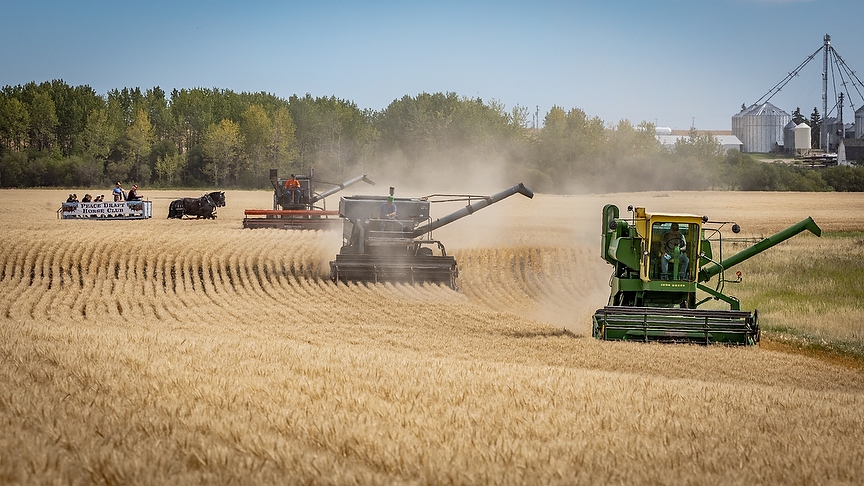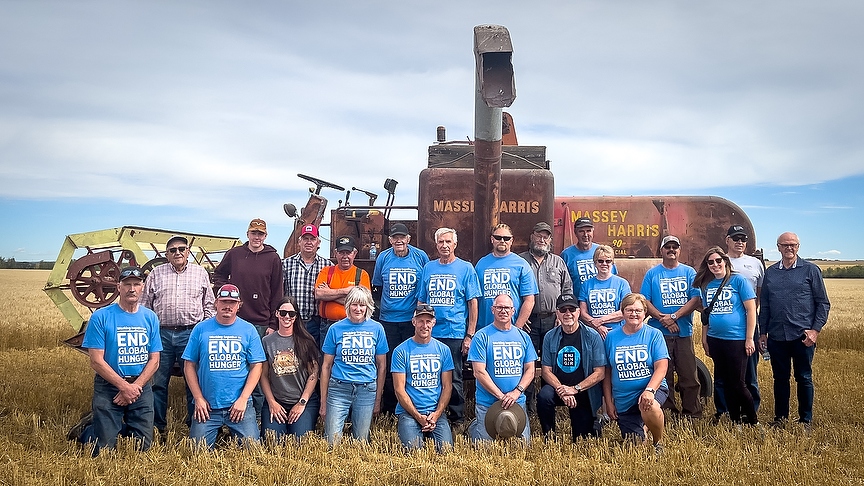
A La Glace area farming co-operative is doing its part to end world hunger, one crop at a time.
The Bear Lake Growing Project (BLGP) was struck more than a decade ago by Gary and Jeanette Beyer who, after years of farming, felt they had a role in helping the less fortunate.
Soon, the co-op was formed and today this non-profit organization consists of 11 local farm families that plant, tend and harvest a crop with sale proceeds donated to the Canadian Foodgrains Bank (CFB).
“I’ve always been aware of the CFB and thought it was a good cause, trying to help the hungry in the world,” recalled Gary. “I thought that this was something I could do to help the hungry of the world.”
“We started the first year ourselves, and invited neighbours and friends,” Gary recalled. They stepped in quickly and “that was the start of it”.

Usually, the crop of choice is wheat, but some years canola was seeded. “Since we like to do the antique combines, canola is hard to do since the combines are so small,” explained Gary.
With the 12th harvest now in the bin, Gary said the community and sponsors have been integral to the initiative.
This year, about 150 acres of hard red spring wheat were taken off in about four hours Aug. 31. In keeping with the theme, it was very much a team effort, said Gary.
“Every year, one of the members donates the land for the harvest,” explains Gary. This year, it was on land owned by Albrecht and Lynn Scheidegger near La Glace.
Rocky Mountain Equipment and Prairie Coast Equipment donated two combines; crop inputs such as chemicals, fuel and fertilizer were donated by other corporate sponsors and community members.
Since BLGP is a grassroots group, making participation accessible across the board was important, notes Jeanette.
“We started sponsor-an-acre where those who wanted to help out in some way could donate $200 to the cause, “ she explained. When the sponsorship was started, it cost about $200 an acre to grow a wheat crop, hence the amount.
“We have numerous people doing that now, from our local churches to the public,” said Jeanette. “It keeps the community involved and spreads the word.”
This year, Gary Dixon - who has a passion for vintage ag equipment - brought over his 1949 Massey Harris 90, Darren Haughian was on site with two vintage Gleaners and a John Deere operated by Ed Krahn rounded out the squad.
The grain was delivered to Viterra grain terminal in Sexsmith.
Though this year’s yield at only 29 bushels/acre was about half of a normal harvest, “with the weather, we’ve been blessed to have gotten that,” said Jeanette.
Still, it will bring about $27,000 in donations to CFB.
Farming sticks with you
The Beyers are retired now, after gleaning a living off their 2,500 acres near La Glace for decades.
Jeanette said they initially got behind the CFB due to its reputation.
“They were considered one of the top 10 charities in Canada,” she said. Jeanette noted the federal government match food aid donations to CFB 4-1.
Still, a project of this scale requires many hands. Fortunately, the South Peace is just the right place, Jeanette said.
“The farmers here, this is what they know how to do,” she said. “They know how to grow a crop.
“We feel very blessed in this country and this is one way we could give back.”
Jeanette noted what is particularly fulfilling is that 12 years on, some of the original farmers have sons coming up; as dads retire, they remain committed to the cause.
Patience and longevity is key, adds Gary.
“One day we won’t have to worry about people without food,” he said. “We have a long way to go.
An international partnership to end hunger
Canadian Foodgrains Bank is a partnership of 15 Canadian churches and church-based agencies working together to end global hunger. It works with locally-based organizations in developing countries to meet emergency food needs, achieve long-term solutions to hunger and work to foster informed action by Canadians and governments to support this international cause.
For most people, the idea of global hunger evokes heartbreaking images of people suffering through extended famine or drought. While this type of acute hunger exists, it only accounts for around 16% of the total number of people facing hunger in the world.
A more complete definition of hunger includes when people do not have enough food - or enough nutritious food - over a long period of time. This kind of chronic hunger is less visible but has major effects on people’s lives. When the body is not being properly nourished, it compensates by slowing down physical and mental activities. This affects children’s growth, concentration at school and work, and weakens the immune system, making people more vulnerable to disease.
It is estimated that up to 757 million people are facing hunger worldwide and do not enjoy “food security,” meaning they do not have regular access to enough nutritious food to live healthy and active lives.